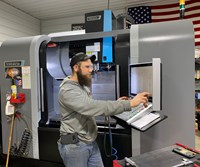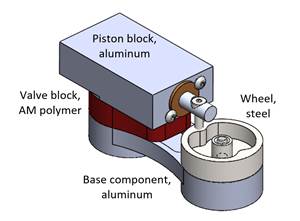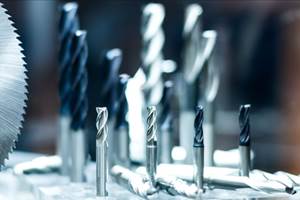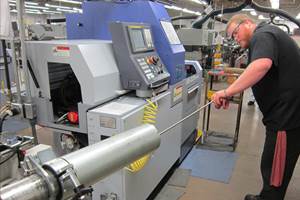Help Set Up a Student-Run CNC Shop Near You
This replicable student-run business model offers promise not only in terms of workforce development, but also in potentially lowering U.S. manufacturing costs.
If you are a regular reader of Modern Machine Shop, then you likely are aware of Cardinal Manufacturing, the student-run manufacturing business within Elva-Strum High School in Strum, Wisconsin. The concept was the brainchild of teacher Craig Cegielski, who sought a solution to the age-old problem of limited funding and support for school vocational programs here in the United States. His idea was to set up a vocational program to function like a manufacturing business and have his students run it. The program would then become financially self-sustaining, because students would be performing real production work for real customers. In addition to the technical training they’d receive, students would also get profit-sharing checks at the end of the year based on their participation. Cardinal Manufacturing launched in 2005, and 110 students have since graduated from this successful program.
We have covered other such subsequently created student-run manufacturing businesses, too. What you might not be aware of, though, is that a nonprofit organization—the American Center for Student Run Manufacturing Businesses—was established last year to help schools set up their own in-house manufacturing businesses. Industry veteran John Silveria is its executive director. Mr. Silveria says the ACSMB seeks to replicate the Cardinal Manufacturing model in other schools across the country, effectively providing a program template and speeding its implementation so those manufacturing businesses can be running and making money within a couple years.
It makes sense for shops of all sizes to consider working with this organization to help set up a student-run manufacturing business in a willing nearby school. That business can take on simple, small-batch work that you might not be able to perform cost-effectively on your sophisticated equipment, leaving those spindles available for more complicated, higher-margin work. Plus, the low hourly rate charged for student labor means parts can be produced for you at a much lower cost. A student-run business also could be a reliable resource for prospective quality talent for your shop. Students who complete the class have more going for them than simply knowing how to weld or program and operate machine tools. By running an actual business, they gain experience dealing with the same practical issues that you do each day, such as scheduling, billing, deadlines, customer service and so on. The program also enables them to hone their soft skills to boost their marketability for whatever career path they might choose.
This approach differs from traditional manufacturing skills training models, and it can be hard for those who are accustomed to those conventional methods to wrap their minds around it. Mr. Silveria says this might be one reason that it has been challenging for the nonprofit to gain traction as quickly as he had hoped. For example, the only “certificate” students who participate in such a program receive is a high school diploma. However, he believes the students are a certification unto themselves having made actual parts and profits running their school manufacturing businesses. The successes they’ve achieved are provable.
Mr. Silveria also envisions a scenario in which machine-tending robots can be used to increase production capacity for student-run businesses. That’s beneficial because increasing profits through automation can enable schools to pay vocational class teachers a higher wage and purchase more advanced equipment to lower production costs to their shops’ customers even more. In turn, if those companies then pass along the savings to their customers, then overall manufacturing costs throughout the entire supply chain are reduced.
So, if this all comes together as Mr. Silveria hopes, the program would simultaneously help close the skills gap, lower U.S. manufacturing costs and increase teacher wages to entice people experienced with manufacturing to be the “CEOs” of student-run businesses.
When speaking with Mr. Silveria, you can sense his passion and strong belief that this program has legs. However, the ACSMB needs support from industry partners. There are various ways that small and large operations can help. Visit the organization’s website if you’d like additional information on ways to get involved.
Related Content
8 Ways to Increase Productivity on the Manufacturing Floor
When it comes to machine shop productivity, continuous improvement depends on efficient employees, equipment and processes.
Read MoreSolve Worker Shortages With ACE Workforce Development
The America’s Cutting Edge (ACE) program is addressing the current shortage in trained and available workers by offering no-cost online and in-person training opportunities in CNC machining and metrology.
Read MoreIf the Federal Government Is to Solve the Manufacturing Labor Shortage, it Needs to Start Here
Student-run businesses focused on technical training for the trades are taking root across the U.S. Can we — should we — leverage their regional successes into a nationwide platform?
Read More6 Tips for Training on a Swiss-Type Lathe
There are nuances to training a person to effectively operate a Swiss-type lathe. Derek Korn, Production Machining’s editor in chief, shares suggestions from a CNC machine shop.
Read MoreRead Next
The Cut Scene: The Finer Details of Large-Format Machining
Small details and features can have an outsized impact on large parts, such as Barbco’s collapsible utility drill head.
Read More3 Mistakes That Cause CNC Programs to Fail
Despite enhancements to manufacturing technology, there are still issues today that can cause programs to fail. These failures can cause lost time, scrapped parts, damaged machines and even injured operators.
Read More
.jpg;width=70;height=70;mode=crop)









.png;maxWidth=300;quality=90)





.png;maxWidth=300;quality=90)









